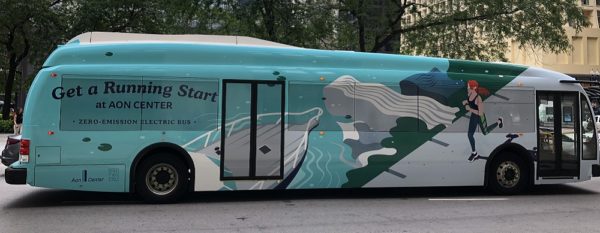
This bus was spotted on 1st October 2019 in downtown Chicago.
In December 2016 the first privately operated zero-emission battery-electric commercial bus fleet began serving the tenants of AON Center and the dual-tower Prudential Plaza, two of Chicago’s largest office properties. The three buildings total approximately 6 million square feet and accommodate 20,000 workers. JLL, the management company for both properties, leased ten battery-powered electric Catalyst buses from Proterra, America’s leading manufacturer of battery-electric buses, replacing eight diesel buses.
The new buses cost tenants $2 a ride and make 82 trips each day between the properties and the Ogilvie, Union and LaSalle Street commuter rail stations, which serve 35,000 passengers every month. Proterra estimates that replacing the diesel buses with zero-emission vehicles will prevent the release of 9.8 million pounds of carbon dioxide and 120 million pounds of greenhouse gases over five years. They also provide a more luxury experience to passengers: leather-wrapped seats, Wi-Fi, USB ports and a mobile app that tracks waiting times.
The owner of the buildings recently completed an $80 million renovation of Prudential Plaza and is currently renovating Aon Center. In the words of the general manager of the buildings: “the old diesel buses that kind of clunked along no longer fit the image of the buildings.” There is a broad recognition that battery-electric transport is an important way to meet the sustainability objectives of property owners and corporate customers.
The five-year lease between JLL and Proterra is the first commercial agreement for an all battery-electric commuter bus fleet in the U.S.
JLL has found that the cost of fuelling and maintaining the Catalyst buses is lower than that for diesel buses. Proterra estimates that replacing a diesel bus with its all-electric model will yield savings of approximately $450,000 ($300,000 in energy and $150,000 in maintenance costs) during the vehicle’s lifetime of up to 18 years. A quote from the chief commercial officer at Proterra is highly informative: “You don’t have oil filters and oil changes and all the hydraulic fluids that you would have with a conventional bus. There are about 30 percent fewer moving parts on a battery-electric bus. We replace an incredibly complicated, very finicky diesel engine with a very simple electric drive train that basically only has two moving parts to it.”
And the same person made a telling point regarding the economics of electric vehicle operation: “We would suggest the customer buy only as much energy storage as they need, so they’re not paying for batteries they never use.” Between the growing price competitiveness of battery-electric buses and consumer demand for greener transportation, Proterra expects the majority of U.S. bus sales to be electric by 2025.







Leave a Comment